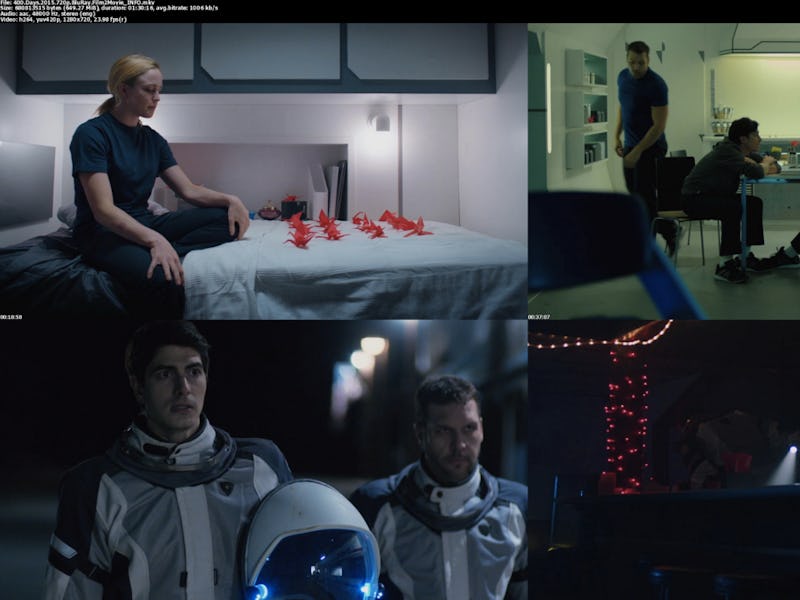SyFy's '400 Days' Makes Astro-Bro Dane Cook Look Good, but There's a Twist
Science fiction is too quick to abandon themes for surprises.

Hey, science fiction! Take it easy with plot twists. I get, it, they’re fun! With enough technology, people’s perceptions can be altered, or they can be transported someplace surprising, or even have the physical world altered around them. (And that’s to say nothing of clones, alternate dimensions, or time travel, all of which provide different avenues for dramatic plot twists.) That’s cool, but you gotta tell a story first. A film must make internal sense for a surprise to land. You can’t shock apathetic people.
I say this because I’ve just seen Matt Osterman’s 400 Days, new On Demand, which is part of Syfy’s aggressive rebranding strategy. It is also a sci-fi film built entirely around the inevitability of a twist. The basic premise as stated — four would-be astronauts are put in a simulation for 400 days in preparation for a run to Mars — needs a twist to congeal into a narrative.
Still, it’s a good setup for a few reasons. It’s timely, with the United States planning on traveling to Mars, and several newsworthy experiments taking place fairly recently to test humans’ ability to deal with one another. There’s also the Mars One (scam?), which recently made waves got appealing to a collection of idealistic young would-be colonists. So the idea is timely.
The premise is also perfect for a surprise. The main characters are stuck in a constrained environment and forced to deal with each other and their own sanity to the point of breakdown. The man running the experiment, Walter Anderson (played by Grant Bowler), even directly states that there are going to be twists in the simulation. And it constantly scatters little clues around telling the audience “something is not as it seems.”
400 Days spends its entire run trying to make the audience question if it’s the story it says that it is. There are secret, possibly-hallucinated messages, inexplicable on-ship disasters, and a scene transition that involves a moment of stars passing-by, a deliberate visual implication of the fake spacecraft being a real spacecraft.
Too many twists in '400 Days' as the "astronauts" leave their "ship"
And then, halfway through the film, 400 Days twists again, pulling the crew out of its craft to reveal … well, it doesn’t reveal exactly what it reveals. Which is the problem. 400 Days is so committed to the idea of having a great twist that it never commits to one. The sense is that the filmmakers were nervous that committing to a plot might diminish the intrigue of the thing and lose the audience. That makes a certain sort of sense, but unrewarded anticipation is a bad look on anyone.
It’s especially frustrating because any level of commitment would have made the film work. The film is well-produced and acted, particularly Caity Lotz walking the fine line between sympathetic and possibly malevolent as the ship’s doctor. (Dane Cook also plays a very punchable bro, but his character is supposed to be that, so, well done!) The premise is also totally workable — four people, in close quarters, for 400 days, would be enough to support a drama on its own, even before the science fiction trappings and twists are added. Yet 400 Days seems remarkably uninterested in that, blowing by hundreds of its days in a couple minutes, shown by an on-screen counter that ends up hurting the film’s premise more than helping viewers with information.
Caity Lotz in '400 Days'
While 400 Days is too enamored with twists to succeed, that’s not entirely its fault. Science fiction on television and film has long loved misdirection — also a throwback to the genre’s short story history. But recently there’s been an escalation of twistiness in SF films. It works at times: Duncan Jones’ Moon may be my favorite recent SF film, and it hinges on a core mystery. Minority Report hinges on a specific mystery, guaranteeing at least one twist.
But the danger — well-realized now — is that audience deception, secrets, and surprises are the core of the genre. Damon Lindelof may be the poster boy for this, with [Prometheus presenting a mystery to be solved](http://entertainment.time.com/2012/06/11/prometheus-alien-ridley-scott/). And one of the reasons Star Trek Into Darkness was so poorly received was a marketing campaign that acted like a transparently obvious twist was worth being coy about.
Indeed, when you look at Star Wars: The Force Awakens, currently setting the standard for SF, the remarkable thing is that it doesn’t have a twist. The main question from marketing going in was “why isn’t Luke Skywalker being show on-screen?” — a question literally answered in the first three seconds of the film.
I hope the lessons of Star Wars are taken to heart, and science fiction films pull back from the puzzle box approach, because 400 Days really shouldn’t be the disappointment it is. What could easily have been a great sci-fi flick is lost behind an obsession with having a story that surprises, instead of working themes and characters.